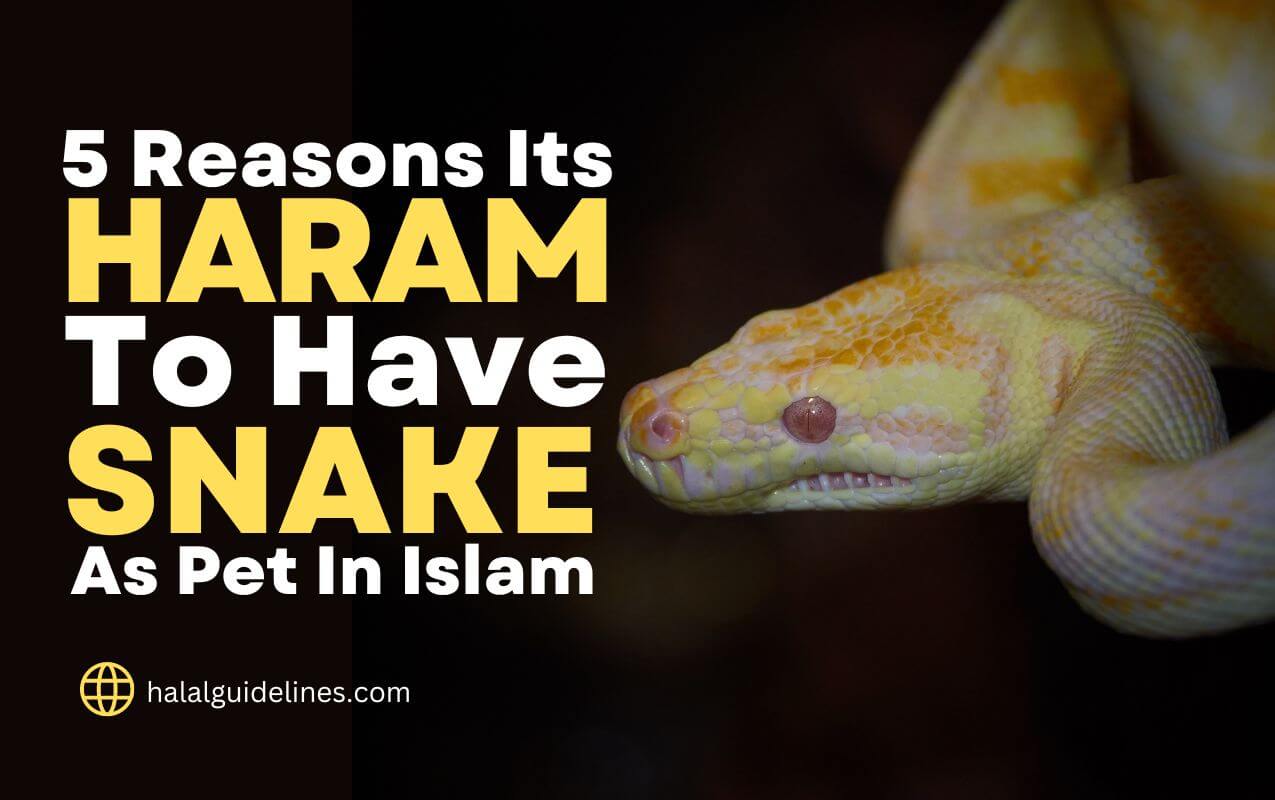Even though some snakes may not be poisonous, most Islamic scholars strictly say that keeping any type of snake as a pet is not right because all snakes are viewed as impure and potentially harmful.
Why Islam Forbids Snake as a Pet
Islam has clear guidelines on what animals are permissible to keep as pets and which ones are forbidden. Snakes fall into the category of creatures that Muslims are advised against keeping away from their home.
5 Reasons Islam Says It is Haram to Have a Pet Like Snake

1. Snakes are considered impure and unholy creatures in Islamic teachings. They are associated with uncleanliness and are generally viewed as repulsive.
2. The Prophet Muhammad (peace be upon him) explicitly commanded Muslims to kill snakes, except in specific situations where they do not pose a threat. This hadith indicates that keeping snakes alive unnecessarily goes against the Prophet’s instructions.
3. Some Islamic texts and traditions link snakes to Shaytan (Satan) or evil forces. Keeping such creatures close in the home is discouraged from this perspective.
4. Even non-venomous snakes can potentially cause harm or inflict injuries through bites or constriction. Islam prioritizes safety and well-being, making snake pets a risky choice.
5. Caring for snakes often involves feeding them live prey like mice or rats. This practice is seen as cruel and contradicts the Islamic principles of kindness towards animals.
While a few Muslims may choose to keep non-venomous snakes as pets, the majority of Islamic scholars agree that it is haram (forbidden) to do so based on religious texts and teachings.
More related articles you may interested to read:
Prophet Muhammad (S.A.W) Hadith Regarding Snake
Islam’s stance on snakes as pets is clear, rooted in the wisdom of the teachings of the Prophet Muhammad (peace be upon him). These sacred sources offer guidance for Muslims, revealing the reasons behind this religious ruling.
Here are the three related hadith:
1. Sahih Muslim, Hadith 5558 Regarding Killing Snake:
Arabic: حَدَّثَنَا أَبُو بَكْرِ بْنُ أَبِي شَيْبَةَ، حَدَّثَنَا عَبْدُ اللَّهِ بْنُ نُمَيْرٍ، عَنْ عُبَيْدِ اللَّهِ، عَنْ نَافِعٍ، عَنْ أَبِي سَلَمَةَ، عَنْ أَبِي هُرَيْرَةَ ـ رضى الله عنه ـ قَالَ قَالَ رَسُولُ اللَّهِ صلى الله عليه وسلم ” قَاتِلُوا الْحَيَّاتِ وَاقْتُلُوهَا Translation: Abu Hurayrah (may Allah be pleased with him) reported that the Messenger of Allah (peace be upon him) said: “Kill snakes and kill them.” Hadith in image format: It clearly instructs that Muslims should kill snakes, as mentioned in other narrations regarding non-venomous/non-threatening snakes. Arabic: حَدَّثَنَا هَنَّادُ بْنُ السَّرِيِّ، حَدَّثَنَا أَبُو مُعَاوِيَةَ، عَنِ الأَعْمَشِ، عَنْ أَبِي صَالِحٍ، عَنْ أَبِي هُرَيْرَةَ، قَالَ: قَالَ رَسُولُ اللَّهِ صلى الله عليه وسلم ” مَنْ قَتَلَ حَيَّةً فَلَهُ أَجْرٌ Meaning: Narrated Abu Hurairah: The Prophet (peace be upon him) said: “Whoever kills a snake, he will have a reward.” Here is the image format of hadith: This saying from the Prophet Muhammad clearly shows that Muslims who kill snakes are doing a rewarding act in the eyes of Islam. Arabic: حَدَّثَنَا عَبْدُ الرَّزَّاقِ، أَخْبَرَنَا مَعْمَرٌ، عَنِ الزُّهْرِيِّ، عَنْ أَبِي سَلَمَةَ، عَنْ أَبِي هُرَيْرَةَ، قَالَ: قَالَ رَسُولُ اللَّهِ صلى الله عليه وسلم ” اقْتُلُوا الْحَيَّاتِ ذَاتَ الْخِيطَيْنِ فَإِنَّهَا تُعْمِي الْبَصَرَ وَتُسْقِطُ الْجَنِينَ Meaning in English: Abu Hurairah narrated that the Prophet (peace be upon him) said: “Kill the snakes and kill the one with two streaks on its back, for it blinds the eye and causes miscarriage.” Look at the hadith related to this topic in image format: From this teaching, we learn that the Prophet Muhammad gave special instructions to kill certain types of snakes known to be extremely harmful and dangerous. Keeping snakes inside the house is a topic that has been talked about a lot by Islamic scholars. Snakes are seen as dangerous and impure creatures, so there has been a big discussion about if you can have them in your homes. We added 2 famous Islamic scholar’s sayings below: Here is the video below of him so you can watch it: Watch out his video below: In the end, it is up to each person to decide if they want to keep a snake at home. But it is very important to think carefully about the possible dangers and spiritual concerns. Getting advice from knowledgeable scholars can help us make the right choice that follows Islamic teachings. In Islam, it’s not recommended to keep snakes as pets because they’re considered impure and can be harmful. Prophet Muhammad advised them to kill them. It’s important to stay safe and spiritually healthy by following guidance from knowledgeable scholars. May Allah keep us away from sin and show us mercy as we try our best to follow His teachings.
2. Jami’ At-Tirmidhi, Hadith 1497 Rewards for Killing Snake:

3. Musnad Ahmad, Vol. 2, Hadith 7738 Related Snake:








